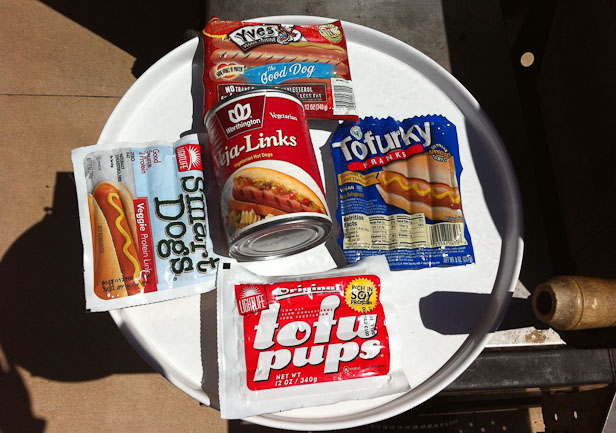 Let’s keep this on the down-low. Photo courtesy of Mike Schmid via flickrAttorneys for D.C. Public Schools have refused to release an accounting of more than $1 million in rebates received from corporate food manufacturers, claiming that details about the rebates constitute “trade secrets” and that exposing them to public scrutiny would hurt the “competitive position” of Chartwells, the school system’s contracted food service provider.
Let’s keep this on the down-low. Photo courtesy of Mike Schmid via flickrAttorneys for D.C. Public Schools have refused to release an accounting of more than $1 million in rebates received from corporate food manufacturers, claiming that details about the rebates constitute “trade secrets” and that exposing them to public scrutiny would hurt the “competitive position” of Chartwells, the school system’s contracted food service provider.
(I first reported the extent of Chartwell’s use of rebates in D.C. school lunches in a July article.)
The ruling by the D.C. Public Schools general counsel’s office places the school district in the awkward position of shielding from public view the purchasing practices of Chartwells and its parent company Compass Group, an international food service giant with operations in 40 countries that last year reported nearly $21 billion in sales and $1.37 billion in profits. Compass Group paid shareholders $386 million in dividends during the same period, according to its 2009 annual report [PDF].
D.C. schools have come under steady fire in recent months for the dubious quality of industrially processed convenience foods Chartwells routinely serves to school children here.
School system attorneys handed down their decision in a letter Thursday in response to a Freedom of Information Act request I made for a detailed accounting of food rebates the schools have received through Chartwells. On July 12, I reported that D.C. Public Schools had received more than $1 million in rebates during the two years that Chartwells has been acting as food services contractor.
The rebates, paid by large food manufacturers, arguably act as an inducement to put highly processed and often sugary convenience foods on children’s cafeteria trays. Numerous companies whose products regularly appear in D.C. school meals refused to discuss details of their rebate practices, including Kellogg, Otis Spunkmeyer, Pepperidge Farm and Cloverland Dairy. As one former food-services exec-turned school-food administrator told me for my July 12 piece, “There’s big money tied up in big company food and agribusiness. There’s not a whole lot of money tied up in fresh vegetables and fruits. So just follow the money. That’s what’s being given to kids.”
Paying rebates for large volume purchases is common practice in the food industry, but shrouded in secrecy. The procurement division of Compass Group and Chartwells in North America — called Foodbuy — makes more than $5 billion worth of purchases every year and employs dozens of people to negotiate contracts with manufacturers and track the rebates that are due. Rebates become an important driver for the types of foods Chartwells uses in its meal service, as well as its bottom line.
Under the federally subsidized school meal program administered by the U.S. Department of Agriculture, food service providers such as Chartwells are required to turn over to their school system clients any rebates they receive, but many in the industry believe that the companies routinely find ways to pocket the money instead. I was able to calculate the total amount of rebates Chartwells has claimed from copies of its monthly invoices that I obtained from D.C. Public School through the Freedom of Information Act. Those rebates worked out to about 5 percent of the total purchases Chartwells reported on those invoices. But the invoices only report the gross amounts of the rebates and do not give any detail about which food manufacturers the rebates come from.
Just nine days after I published my initial report, the attorney general of New York, Andrew M. Cuomo, announced that Sodexo, another international food services giant, had agreed to pay the state $20 million to settle claims that it had improperly withheld rebates from numerous school districts and universities there. “This company cut sweetheart deals with suppliers and then denied taxpayer-supported schools the benefits,” Cuomo said in a statement.
Subsequently, D.C. councilmember Mary Cheh (D-Ward 3), wrote D.C. Attorney General Peter Nickles, asking him to intervene and assist schools here to make sure they are receiving all of the rebates to which they are entitled from Chartwells.
Cuomo said his action against Sodexo was part of a wider and ongoing investigation of rebates in publicly-funded food service. Concerns about rebates in school food appear to be spreading. Following news of New York’s settlement with Sodexo, legislators in New Jersey called on that state’s attorney general to investigate the company’s practices in schools there as well.
Federal law also stipulates that food service companies must provide a detailed accounting of where their rebates come from, but only when a school district requests it. Following my July 12 report, Anthony Tata, the chief operating officer for D.C. Public Schools, disclosed to The Washington Post that he had made such a request in October 2009 and had waited nine months for Chartwells to comply.
The rebates appear to have become something of an embarrassment to Tata and others in schools Chancellor Michelle Rhee’s administration. Tata told The Post that his staff was working to improve the food Chartwells serves “and the rebate, if there is one, will not factor at all into our decision making.”
When I asked a schools spokeswoman for a copy of Chartwells’ rebate itemization, I was told to submit a Freedom of Information Act request. The decision by school system attorneys to deny my request and squelch that report would appear only to increase the drama surrounding food rebates at a time when Tata is trying to show that he and newly hired food services director Jeffrey Mills are moving the school meals program in a positive direction.
Rebates seem to go hand-in-hand with popular brands of sugary processed foods such as Apple Jacks cereal, Pop-Tarts, Giant Goldfish Graham and Otis Spunkmeyer muffins — all regular fare, up to now, in D.C. school breakfasts. By contrast, healthier alternatives such as Nature’s Path organic cereal do not offer rebates. Bonnie Christensen, executive chef for schools in Berkeley, Calif., which serve Nature’s Path and make most of their food from scratch using raw ingredients, said she doesn’t deal in rebates at all.
At any rate, in school systems that do rely on rebates, one might assume that parents have the right to full disclosure of how money from billion-dollar food corporations influences the meals their children are fed at school. D.C. Public Schools should open its books.



